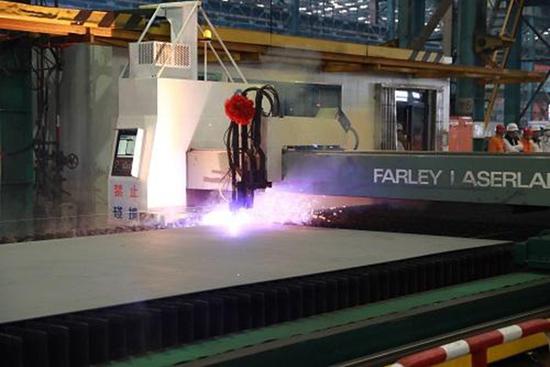


On Dec. 20, Shanghai-based Jiangnan Shipyard Co. Ltd. officially began to build China's first domestically produced polar icebreaker. Expected to be completed in 2019, the ship will establish an icebreaker fleet with Xuelong, China's current largest polar icebreaker, bought from a Ukrainian company.
With a designed draft of 7.85 meters and displacement of 13,990 tons, the new vehicle will be 122.5 meters long and 22.3 meters wide. It will be able to sail as fast as 12 to 15 knots, covering a range of 20,000 nautical miles. It will accommodate 90 crew members and be able to sail at 2 to 3 knots even in 1.5-meter-thick ice and 0.2-meter-thick snow.
Both ends of the ship are designed to break ice, and the vehicle will be able to spin 360 degrees and break 20-meter-thick first-year ice. Upon completion, the ship will greatly improve the mobility of China's arctic ships.
The icebreaker will be equipped with advanced oceanographic survey and observation equipment. Researchers will use the vessel to carry out comprehensive surveys and observations of the ocean, sea ice and atmosphere.
Lin Shanqing, deputy director of the State Oceanic Administration, said that the construction of China's first homegrown arctic icebreaker is a major step forward for the country's polar research.
 Fire brigade in Shanghai holds group wedding
Fire brigade in Shanghai holds group wedding Tourists enjoy ice sculptures in Datan Town, north China
Tourists enjoy ice sculptures in Datan Town, north China Sunset scenery of Dayan Pagoda in Xi'an
Sunset scenery of Dayan Pagoda in Xi'an Tourists have fun at scenic spot in Nanlong Town, NW China
Tourists have fun at scenic spot in Nanlong Town, NW China Harbin attracts tourists by making best use of ice in winter
Harbin attracts tourists by making best use of ice in winter In pics: FIS Alpine Ski Women's World Cup Slalom
In pics: FIS Alpine Ski Women's World Cup Slalom Black-necked cranes rest at reservoir in Lhunzhub County, Lhasa
Black-necked cranes rest at reservoir in Lhunzhub County, Lhasa China's FAST telescope will be available to foreign scientists in April
China's FAST telescope will be available to foreign scientists in April "She power" plays indispensable role in poverty alleviation
"She power" plays indispensable role in poverty alleviation Top 10 world news events of People's Daily in 2020
Top 10 world news events of People's Daily in 2020 Top 10 China news events of People's Daily in 2020
Top 10 China news events of People's Daily in 2020 Top 10 media buzzwords of 2020
Top 10 media buzzwords of 2020 Year-ender:10 major tourism stories of 2020
Year-ender:10 major tourism stories of 2020 No interference in Venezuelan issues
No interference in Venezuelan issues
 Biz prepares for trade spat
Biz prepares for trade spat
 Broadcasting Continent
Broadcasting Continent Australia wins Chinese CEOs as US loses
Australia wins Chinese CEOs as US loses